2024 to 2019 Researcher of the Year
2024 Researcher of the Year
Mashrur "Ronnie" Chowdhury
Professor, Eugene Douglas Mays Chair of Transportation
Automotive Engineering
College of Engineering, Computing and Applied Sciences
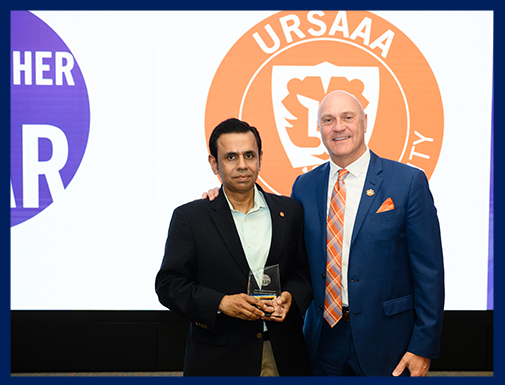 Chowdhury's research focuses on the evolving realms of sensing, communications, computing, cybersecurity, and cyber-resiliency, all with the goal of establishing a secure and resilient IoT environment for smart cities and regions. Chowdhury and his team delve into the myriad vulnerabilities present in the nation’s transportation systems, public infrastructures, and cyber-physical-social systems, while also exploring strategies to mitigate these vulnerabilities effectively. Chowdhury serves as founding director of the National Center for Transportation Cybersecurity and Resiliency (TraCR) and the Center for Connected Multimodal Mobility (C2M2), both sponsored by the U.S. Department of Transportation. Chowdhury is a Fellow of the American Society of Civil Engineers, a senior member of the Institute of Electrical and Electronics Engineers, and a member of the Transportation Research Board Committee on Intelligent Transportation Systems.
Chowdhury's research focuses on the evolving realms of sensing, communications, computing, cybersecurity, and cyber-resiliency, all with the goal of establishing a secure and resilient IoT environment for smart cities and regions. Chowdhury and his team delve into the myriad vulnerabilities present in the nation’s transportation systems, public infrastructures, and cyber-physical-social systems, while also exploring strategies to mitigate these vulnerabilities effectively. Chowdhury serves as founding director of the National Center for Transportation Cybersecurity and Resiliency (TraCR) and the Center for Connected Multimodal Mobility (C2M2), both sponsored by the U.S. Department of Transportation. Chowdhury is a Fellow of the American Society of Civil Engineers, a senior member of the Institute of Electrical and Electronics Engineers, and a member of the Transportation Research Board Committee on Intelligent Transportation Systems.
Thao T. Tran
Assistant Professor
Chemistry
College of Science
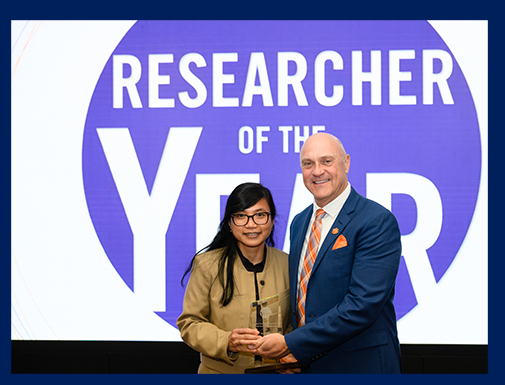 Tran's research focuses on developing a deeper understanding of how chemistry determines targeted physical properties in innovative materials and why such chemistry-property relationships exist. Her work is supporting important advances in energy and information technologies that could advance environmental conservation, national security, and healthcare. Her work has wide-ranging applications. Tran is one of just 11 researchers from the United States selected for a prestigious 2023 Beckman Young Investigators Award from the Arnold and Mabel Beckman Foundation to support her research in quantum technology. She is the first recipient from Clemson or any college or university in South Carolina. Tran is also a recipient of the National Science Foundation’s Early CAREER Award and the College of Science 2024 Rising Star in Discovery Award. She was honored as 2024 Scialog Fellow by the Research Corporation for Science Advancement and named 2024 Rising Star in Materials Chemistry Science by American Chemical Society Materials Au.
Tran's research focuses on developing a deeper understanding of how chemistry determines targeted physical properties in innovative materials and why such chemistry-property relationships exist. Her work is supporting important advances in energy and information technologies that could advance environmental conservation, national security, and healthcare. Her work has wide-ranging applications. Tran is one of just 11 researchers from the United States selected for a prestigious 2023 Beckman Young Investigators Award from the Arnold and Mabel Beckman Foundation to support her research in quantum technology. She is the first recipient from Clemson or any college or university in South Carolina. Tran is also a recipient of the National Science Foundation’s Early CAREER Award and the College of Science 2024 Rising Star in Discovery Award. She was honored as 2024 Scialog Fellow by the Research Corporation for Science Advancement and named 2024 Rising Star in Materials Chemistry Science by American Chemical Society Materials Au.
2024 SENIOR FACULTY NOMINEES
2024 JUNIOR FACULTY NOMINEES
2023 Researcher of the Year
Srikanth Pilla
ExonnMobil Employees Endowed Chair
Automotive Engineering
College of Engineering, Computing and Applied Sciences
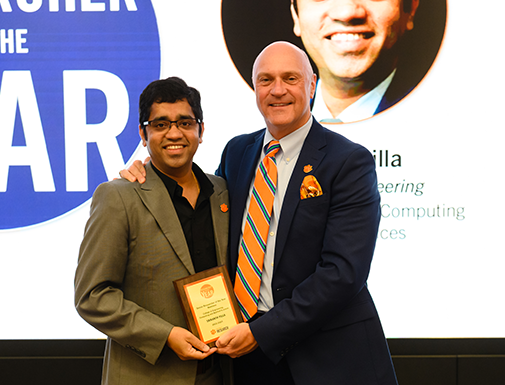
Pilla’s research interests are in the fundamentals and applications of sustainable and lightweight functional materials and manufacturing technologies. He is founder of the Clemson Composites Center, a multi-disciplinary, industry-focused research and development center, and leads AIM for Composites, a new $10 million U.S. Department of Energy-funded Energy Frontier Research center that is working to create a new design approach that utilizes artificial intelligence to assist the discovery of advanced composites. Pilla has amassed more than $62 million in grant awards, co-authored more than 150 peer-reviewed articles and received numerous accolades, including the Department of Energy Vehicle Technologies Office Distinguished Team Award, the Environmental Protection Agency Presidential Green Chemistry Challenge Award, and the S.C. Governor’s Young Scientist Award for Excellence in Scientific Research. He has advised 10 doctoral students, 22 master’s students and 20 undergraduate students.
Richard Boyles
Assistant Professor
Plant Breeding & Genetics
College of Agriculture, Forestry and Life Sciences

Boyles, a cereal grains breeder and geneticist at Clemson’s Pee Dee Research and Education Center, combines molecular and conventional breeding methods to develop disease-resistant, nutritional crop varieties and hybrids with improved productivity. He received an Innovator Award from the Clemson University Research Foundation by licensing sorghum and oat lines that are now commercialized and are being grown on thousands of acres across the southeastern United States. He is chair-elect of the C-8 Plant Genetic Resources Division of the Crop Science Society of America and is a member of key committees such as the National Wheat Improvement Committee and the U.S. Wheat and Barley Scab Initiative. He has received nearly $15 million in research funding and has published 32 peer-reviewed articles. He has advised one PhD graduate and is currently advising a postdoctoral fellow and three graduate students. Boyles earned his PhD from Clemson in 2016 and in 2019 became a faculty member in the Department of Plant and Environmental Sciences.
Meet the 2023 Senior Faculty Nominees
JUNIOR FACULTY NOMINEES
2022 Researcher of the Year
Senior Researcher of the Year
Brian Powell
Professor
Nuclear Environmental Engineering and Science
College of Engineering, Computing and Applied Sciences
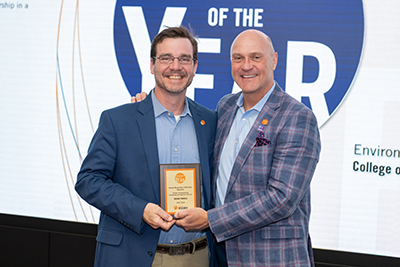 Dr. Brian A. Powell is a Professor in the Department of Environmental Engineering and Earth Sciences at Clemson University and holds the Fjeld Professorship in Nuclear Environmental Engineering and Science.
Dr. Brian A. Powell is a Professor in the Department of Environmental Engineering and Earth Sciences at Clemson University and holds the Fjeld Professorship in Nuclear Environmental Engineering and Science.
Dr. Powell has published over 60 refereed journal publications, 16 research reports, and made over 100 technical presentations on these topical areas. He has conducted sponsored research in a wide range of projects dealing with topics of nuclear forensics, evaluation of nanoparticle behavior, sorption and environmental transport of plutonium, development of radiation detection and radiation detection laboratory courses, iodine, radium, strontium geochemistry in wetland and subsurface sediments, radionuclide geochemistry of saltstone and solid waste performance assessments at the Savannah River Site, measurement of thermodynamic parameters supporting advanced fuel cycle chemistry, and related topics. These research projects have received over $16.9M in funding from the National Science Foundation, the Department of Energy, the Nuclear Regulatory Commission, the Department of Homeland Security, the National Nuclear Security Agency, and Savannah River Nuclear Services (through the South Carolina Universities Education and Research Foundation). The knowledge gained from this work can be used to evaluate risk posed by subsurface contamination, to design remediation strategies for contaminated sites, and to facilitate the use of safe disposal practices.
Junior Researcher of the Year
Nathan McNeese
Assistant Professor
Human Centered Computing
College of Engineering, Computing and Applied Sciences
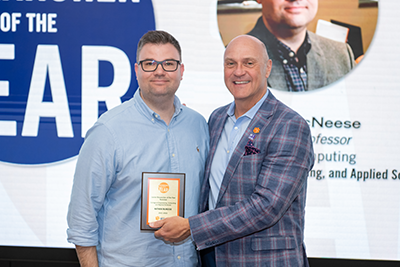
Dr. Nathan J. McNeese is the CECAS Dean’s Professor and Assistant Professor of Human-Centered Computing and Director of the Team Research Analytics in Computational Environments (TRACE) Research Group within the division of Human-Centered Computing in the School of Computing at Clemson University. Dr. McNeese is also the Director of the university-wide Clemson University Data (Science) Lab. He also holds a secondary appointment in Clemson’s Human Factors Institute, is a Faculty Scholar in Clemson’s School o Health Research, and a Watt Family Faculty Fellow. Dr. McNeese received a Ph.D. in Information Sciences & Technology from The Pennsylvania State University. For over 15 years, Dr. McNeese has conducted research mainly focused on teamwork, artificial intelligence (AI), and collaborative technology within a variety of different contexts (command & control, manufacturing, emergency crisis management, and healthcare).
Nathan McNeese’s research seeks to better understand teamwork in health care domains through studying health care teams in context and then developing human-centered collaborative technologies to support specific teamwork activities. He is particularly interested in studying the concepts of team cognition, artificial intelligence, and collaborative technology design and development.
Meet the 2022 Senior Faculty Nominees
Junior Faculty Nominees
2021 RESEARCHER OF THE YEAR
Senior Researcher of the Year
Rhondda Thomas
Calhoun Lemon Professor of Literature
English
College of Architecture, Arts and Humanities
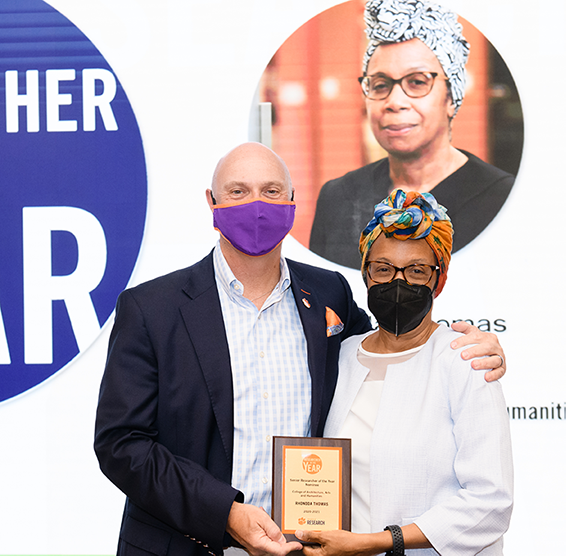
A recipient of the prestigious Whiting Foundation fellowship, Thomas has garnered national and international recognition for her interdisciplinary, multifaceted Call My Name Project. The project documents and shares the stories of African Americans in the history of Clemson University and local communities from freedom in Africa through desegregation in South Carolina.
Her book published in November was recognized in the 2021 book award competition by the National Council on Public History. She is editing a collection of 10 essays on The Rhetorics of Campus History and is completing two projects with Cambridge University Press. Additionally, she is working to complete with funding from the National Endowment for the Humanities the Call My Name traveling museum exhibit, scheduled to begin touring in early 2022. Thomas is a faculty member in the College of Architecture, Arts and Humanities.
Junior Researcher of the Year
Lior Rennert
Assistant Professor
Public Health Sciences
College of Behavioral, Social and Health Sciences
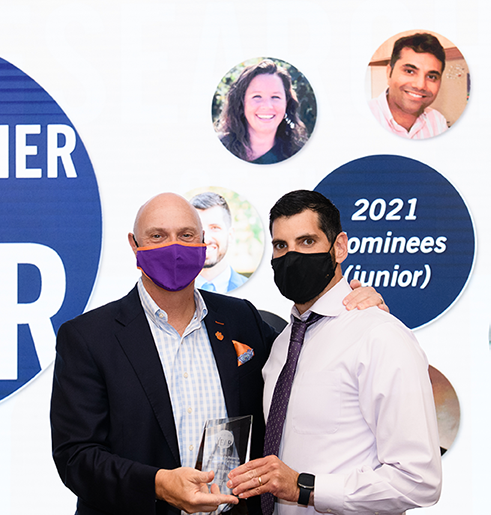
Rennert – a faculty member in the College of Behavioral, Social and Health Sciences – is an internationally recognized infectious disease scholar. His primary research activities include the modeling, evaluation, and implementation of effective COVID-19 testing strategies and public health interventions.
He has published his work in prestigious international journals and earned five 1st author manuscripts in high impact journals in the past year, including The Lancet Child & Adolescent Health and BMC Medical Research Methodology. Rennert is principal investigator on multiple externally funded grants, and his work has been covered by several media outlets. He also serves as a reviewer for six journals, including the British Medical Journal and Clinical Infectious Diseases.
2021 SENIOR FACULTY NOMINEES Nominees from Each College
2021 JUNIOR FACULTY NOMINEES Nominees from Each College
2020 Researcher of the Year
Senior Researcher of the Year
Hai Xiao
Samuel Lewis Bell Distinguished Professor
Electrical and Computer Engineering
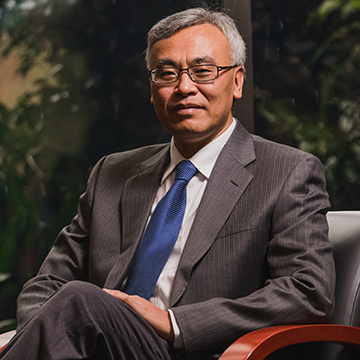
Hai Xiao’s research interests focus on photonic and microwave technologies, novel devices and materials, imaging instrumentation and advanced manufacturing for applications in energy, intelligent infrastructure, clean-environment, biomedical sensing/imaging, and national security.
Xiao has organized and led several large multidisciplinary research projects at Clemson and currently serves as the principal investigator of seven projects with nearly $8.5 million in external funding.
He has published 88 peer-reviewed articles, earned 6 patents and graduated 10 PhD students since 2013. Xiao is currently mentoring eight PhD students and two master’s students.
Junior Researcher of the Year
Vincent Richards
Associate Professor
Biological Sciences Department

Vincent Richards uses microbial genomics to further the understanding of the relationship between diverse microbial communities and human health. His most recent work has focused on the oral microbiome, specifically the bacterial and fungal microbial communities in the mouth that are associated with tooth decay. Richards’ research has the potential to support the development of novel therapeutics and prevention strategies.
He has received more than $2 million in funding from the National Institutes of Health and has published 41 papers, including 13 in the past two years. Additionally, Richards is mentoring two PhD students, a master’s student and two undergraduates.
2020 Junior Researcher of the Year Nominees from Each College
2020 Senior Researcher of the Year Nominees from Each College
2019 Researcher of the Year
Senior Researcher of the Year
Ken Marcus
Professor
Department of Chemistry
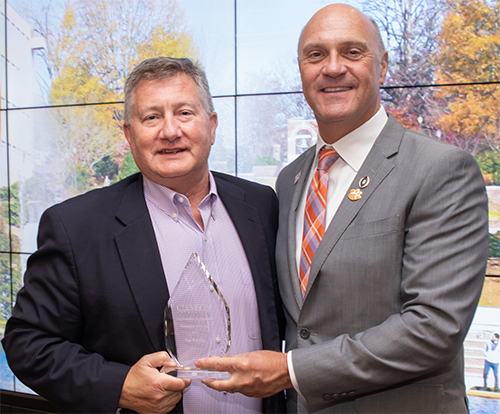
Dr. Marcus specializes in the development of analytical chemistry instrumentation and holds nearly 15 patents on technologies now commercially available. His discoveries have fueled innovations in health care, national defense, advanced materials and other industries. Dr. Marcus is a fellow of the Royal Society of Chemistry (London), the American Association for the Advancement of Science, the Society for Applied Spectroscopy and the National Academy of Inventors. He also serves on the editorial advisory board of three scientific journals.
Junior Researcher of the Year
Mark Blenner
McQueen-Quattlebaum Associate Professor
Department of Chemical and Biomolecular Engineering
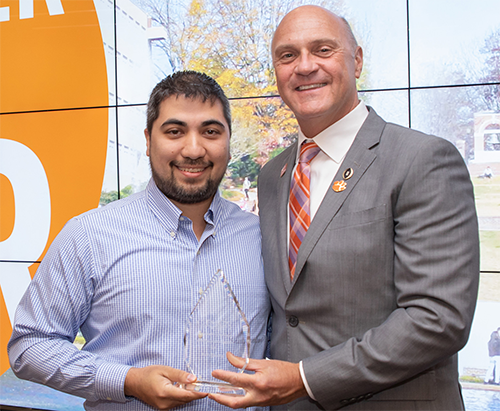
Dr. Blenner is a biotechnology expert whose innovations using metabolic engineering and synthetic biology are facilitating the conversion of low-value renewable substrates into more valuable products like biofuels, bioplastics, pharmaceuticals and omega-3 fatty acids for supplements and fish feed. His diverse research portfolio has applications in space exploration, waste utilization, covert surveillance of nuclear weapons development and much more. Blenner also is leading a statewide effort to attract more chemical engineering students with an eye toward diversifying the profession.


















































































